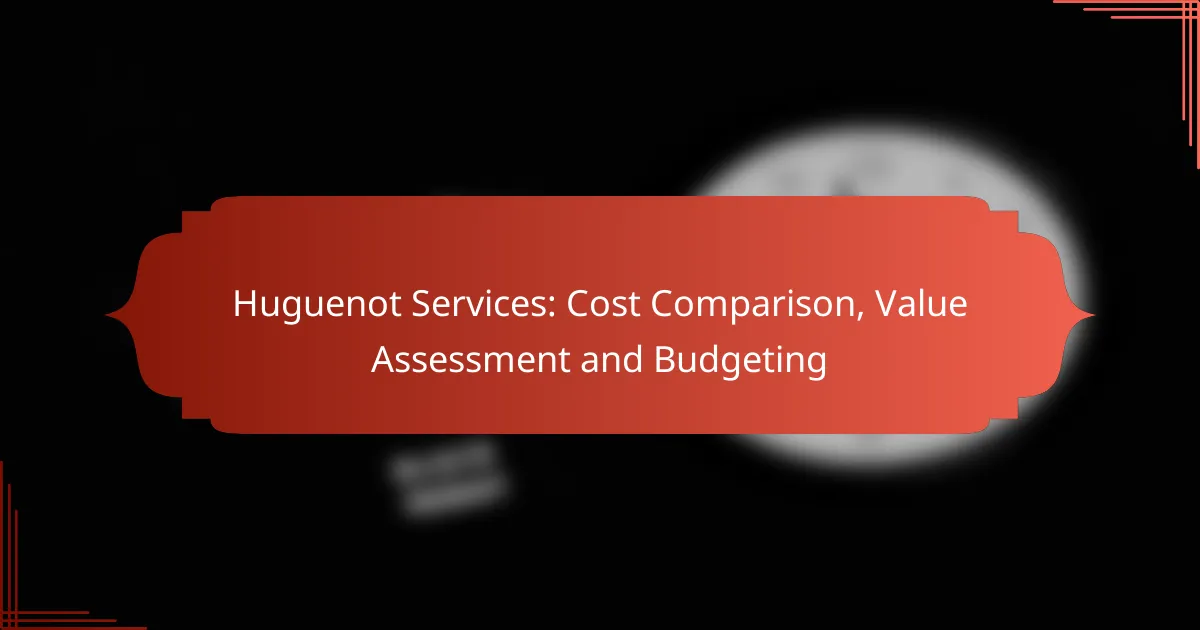When considering Huguenot Services in Ireland, it’s essential to understand the varying costs associated with different service types and providers, which can range from a few hundred to several thousand euros. Assessing the value of these services involves evaluating quality, customer satisfaction, and cost-effectiveness to ensure they align with your needs. Additionally, effective budgeting strategies can help manage expenses by prioritizing needs and allowing for flexibility in financial planning.

What are the costs of Huguenot Services in Ireland?
The costs of Huguenot Services in Ireland can vary significantly based on the type of service required and the specific provider. Generally, clients should expect to spend anywhere from a few hundred to several thousand euros depending on the complexity and scope of the services offered.
Average pricing for basic services
Basic Huguenot Services typically range from €300 to €1,500. This includes essential offerings such as document retrieval, genealogical research, and consultation services. Prices may fluctuate based on the provider’s expertise and the depth of research required.
For instance, a straightforward family history report might cost around €500, while more comprehensive services that involve extensive archival research can reach upwards of €1,200.
Cost breakdown by service type
Understanding the cost breakdown by service type helps clients budget effectively. Common services include genealogical research, which can range from €400 to €1,000, and document retrieval, typically priced between €200 and €600.
Additional services such as historical consultations or specialized research may incur extra fees, often starting at €150 per hour. Clients should inquire about package deals that might offer better value for multiple services.
Factors influencing service costs
Several factors influence the costs of Huguenot Services in Ireland. The complexity of the research, the time required, and the specific expertise of the service provider are key considerations. More intricate family histories or those requiring access to rare documents will naturally cost more.
Additionally, geographic location can play a role; services based in urban centers may charge higher rates than those in rural areas. Clients should also consider the reputation and track record of the provider, as established experts may command premium pricing.

How to assess the value of Huguenot Services?
To assess the value of Huguenot Services, consider factors such as service quality, customer satisfaction, and cost-effectiveness. Evaluating these elements helps determine if the services meet your needs and expectations.
Key value metrics for evaluation
When evaluating Huguenot Services, focus on metrics like service reliability, response times, and overall performance. These indicators provide insight into how well the services function in real-world scenarios.
Consider using a scoring system to rate each metric on a scale, allowing for a clearer comparison. For example, a score of 1-5 can help quantify aspects like timeliness and effectiveness.
Customer satisfaction ratings
Customer satisfaction ratings are crucial for assessing the value of Huguenot Services. Look for reviews and testimonials from past clients to gauge their experiences and overall happiness with the services provided.
Surveys can also be a useful tool to collect feedback directly from users. Aim for a satisfaction rate of at least 80% to ensure that the majority of customers find value in the services.
Comparative value against competitors
Comparing Huguenot Services to competitors helps identify its strengths and weaknesses. Analyze pricing, service offerings, and customer feedback to see how it stacks up against similar providers.
For a thorough comparison, create a table that lists key features and costs of Huguenot Services alongside those of competitors. This visual representation can clarify which service offers the best value for your budget.

What budgeting strategies are effective for Huguenot Services?
Effective budgeting strategies for Huguenot Services involve careful planning, prioritization of needs, and flexibility to adapt to changing circumstances. By creating a structured budget plan, identifying cost-saving opportunities, and setting aside funds for unexpected expenses, individuals can manage their finances more effectively.
Creating a budget plan
To create a budget plan for Huguenot Services, start by listing all expected expenses, including service fees, materials, and any additional costs. Categorize these expenses into fixed and variable costs to better understand your financial commitments.
Next, allocate a specific amount of your monthly income to each category, ensuring that essential services are prioritized. Regularly review and adjust your budget as needed to reflect any changes in income or expenses.
Cost-saving tips for services
To save on Huguenot Services, consider comparing prices from different providers to find the best value. Look for discounts or package deals that may offer lower rates for bundled services.
Additionally, consider using community resources or volunteer services that may provide similar support at a reduced cost. Engaging with local organizations can also lead to potential savings while fostering community connections.
Allocating funds for unexpected expenses
Setting aside a portion of your budget for unexpected expenses is crucial for financial stability. Aim to reserve about 10-15% of your monthly budget for emergencies or unforeseen costs related to Huguenot Services.
Regularly assess your savings and adjust the amount you set aside based on your financial situation. This proactive approach helps ensure that you are prepared for any surprises without disrupting your overall budget.

What are the prerequisites for using Huguenot Services?
To use Huguenot Services, clients must meet specific prerequisites that include providing necessary documentation and fulfilling eligibility criteria. Understanding these requirements is essential for a smooth application process.
Required documentation
Clients must prepare several key documents to access Huguenot Services. Commonly required items include proof of identity, such as a government-issued ID, and financial documents that demonstrate income levels or assets.
Additional documentation may include residency verification, such as utility bills or lease agreements, and any relevant legal documents if applicable. Ensuring all paperwork is complete and accurate can significantly expedite the approval process.
Eligibility criteria for clients
Eligibility for Huguenot Services typically hinges on several factors, including income thresholds and residency status. Clients must usually demonstrate that their income falls within a specified range to qualify for assistance.
Moreover, residency requirements may stipulate that clients must be residents of a particular region or community. It’s advisable to check local guidelines to confirm specific eligibility criteria and avoid common pitfalls during the application process.

How do Huguenot Services compare to similar offerings?
Huguenot Services provide unique cultural and genealogical resources that may differ significantly from other heritage services. Their focus on the Huguenot diaspora offers specialized insights and support that are often not available through general heritage services.
Comparison with other heritage services
When comparing Huguenot Services to other heritage offerings, it’s essential to consider the specific focus on Huguenot history and culture. Many general heritage services cover a broad range of topics, while Huguenot Services delve deeply into the unique experiences and contributions of Huguenots, particularly in regions like France, the UK, and the Netherlands.
Costs for general heritage services can vary widely, often ranging from low tens of dollars for basic resources to several hundred for comprehensive packages. In contrast, Huguenot Services may have similar pricing structures but often include specialized research and documentation that justify the investment.
Unique features of Huguenot Services
Huguenot Services stand out due to their tailored resources, such as access to exclusive archives, expert consultations, and community events focused on Huguenot heritage. These features provide clients with a deeper understanding of their ancestry and cultural identity.
Additionally, many Huguenot Services offer personalized research assistance, which can be invaluable for individuals seeking to trace their lineage. This level of customization is less common in broader heritage services, making Huguenot Services particularly valuable for those with specific genealogical interests.

What are the emerging trends in Huguenot Services?
Emerging trends in Huguenot Services focus on enhancing accessibility, integrating technology, and promoting cultural heritage. These trends aim to improve service delivery and engagement with communities, ensuring that Huguenot history remains relevant and accessible to a wider audience.
Innovations in service delivery
Innovations in Huguenot Services include the use of mobile applications and virtual reality experiences that allow users to explore historical sites remotely. These technologies can enhance visitor engagement and provide educational resources that were previously unavailable.
Additionally, partnerships with local organizations and educational institutions are becoming more common, facilitating workshops and events that promote Huguenot culture. This collaborative approach helps to reach diverse audiences and fosters community involvement.
Future outlook for heritage services
The future of heritage services related to the Huguenots looks promising, with a growing emphasis on sustainability and inclusivity. As more funding becomes available for cultural preservation, organizations are likely to invest in projects that highlight the contributions of Huguenots to society.
Moreover, there is an increasing recognition of the importance of diverse narratives in heritage services. This shift encourages the inclusion of underrepresented voices and stories, enriching the overall understanding of Huguenot history.
Impact of digital transformation on services
Digital transformation is significantly impacting Huguenot Services by streamlining operations and enhancing user experiences. Online platforms for ticketing, information dissemination, and community engagement are becoming standard, making it easier for visitors to access services.
Furthermore, social media and digital marketing strategies are being employed to reach broader audiences. These tools allow organizations to share stories, promote events, and connect with individuals interested in Huguenot heritage, ultimately fostering a more engaged community.
